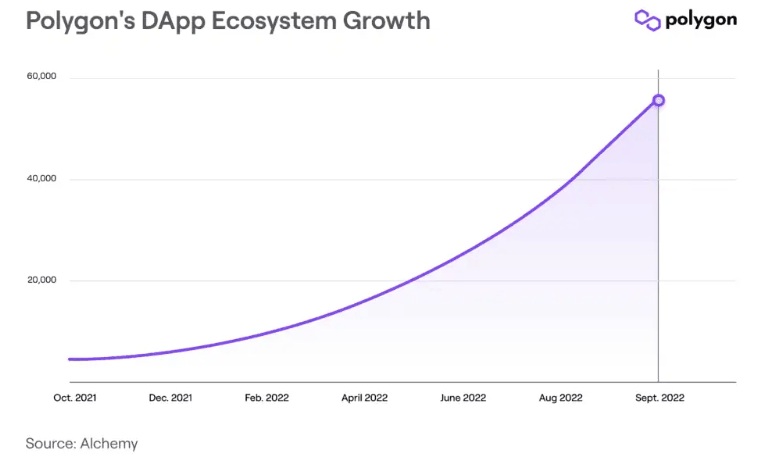The Polygon ($MATIC) team recently announced that according to data from Web3 development platform Alchemy, there are currently over 53,000 decentralized applications (dApps) deployed on Polygon.
Polygon is “a decentralised Ethereum scaling platform that enables developers to build scalable user-friendly dApps with low transaction fees without ever sacrificing on security.” The Polygon Lightpaper describes Polygon as “a protocol and a framework for building an connecting Ethereum-compatible blockchain networks.”
On 18 May 2021, Independent Ethereum educator, investor and advisor Anthony Sassano took to Twitter to clear up some of the confusion around Polygon (e.g. some people refer to Polygon as a sidechain to Ethereum, while others call it an L2 blockchain). Below are a few highlights from that Twitter thread:
- “There is the Matic Plasma Chain and the Polygon PoS chain. The vast majority of the activity is happening on the PoS chain.“
- “The PoS chain is what people refer to as a ‘sidechain’ to Ethereum because it has its own permissionless validator set (100+ who are staking MATIC) which means it doesn’t use Ethereum’s security (aka Ethereum’s PoW).“
- “The PoS chain goes beyond a standard sidechain and actually relies on and commits itself to Ethereum (what some people may call a ‘commit-chain’). It relies on Ethereum because all of the validator/staking logic for the PoS chain lives as a smart contract on Ethereum.“
- “This means that if the Ethereum network went offline, the Polygon PoS chain would also go offline. Secondly, the PoS chain actually commits/checkpoints itself to Ethereum every so often.“
- “This has 2 benefits: it provides Ethereum-based finality to the PoS chain & it can help the chain recover in case of catastrophic event. This also means that Polygon is paying Ethereum to use its blockspace (in ETH) & paying for it to secure the contracts & checkpointing.“
According to the blog post published by the Polygon team on 17 October 2022, this 53K figure “represents an increase of over 60% since June and almost an eightfold jump from the start of the year” and it is “the cumulative number of applications ever launched on both the mainnet and the testnet and represents a highwater mark of ecosystem activity.”

Polygon’s blog post went to say:
“Monthly active dApps, a closer approximation of the number of live applications in the ecosystem, rose 29% since the end of last quarter to 17,800, Alchemy data show. The increase is fourfold from the start of the year.
“The number of monthly active teams, the most direct measure of developer activity on the Polygon PoS chain, rose 27% to about 13,700. About 66% of the projects are building solely on Polygon, with the remainder also launching on Ethereum. A single team can have multiple dApps on the chain, not all of which are consumer-facing.
“The adoption of Polygon on Alchemy led to a surge in the popularity of new decentralized finance (DeFi) applications and non-fungible tokens (NFTs) on the chain. With over 174.9 million unique user addresses and $5 billion in assets secured, Polygon PoS has processed more than 2.1 billion transactions till date.“
On 19 October 2022, Polygon announced that it is helping Brazil-headquartered digital bank (i.e. internet only) Nubank to make the transition from Web2 to Web3:
Polygon’s blog post about this announcement said that FinTech firm Nubank, which was founded in 2013, is “partnering with Polygon to launch its cryptocurrency token and leverage the democratizing power of Web3” and that the Nucoin token will be “powered by Polygon Supernets technology, which allows for the creation of application-specific, scalable, and customizable blockchain networks.” Apparently, Nubank “plans to airdrop the digital token to its customers in the first half of 2023.” These tokens will “serve as the basis for its customers loyalty rewards program and will have benefits such as discounts and other advantages.”
Sandeep Nailwal, co-founder of Polygon, had this to say:
“One of the largest digital banking institutions in the world, offering its own cryptocurrency is a strong testament to the utility blockchain and crypto have to offer. Nubank’s customer loyalty rewards program, powered by Polygon, will deliver the transformative benefits of blockchain technology to its customers, while acknowledging the shift happening in the traditional finance space.“
Image Credit
Featured Image via Pixabay









